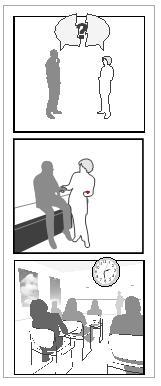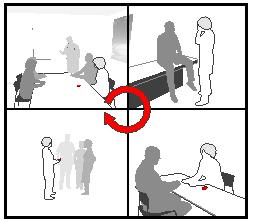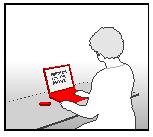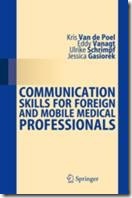An interview with the authors Kris Van de Poel, Eddy Vanagt, Ulrike Schrimpf and Jessica Gasiorek.
Communication Skills for Foreign and Mobile Medical Professionals (or in short Medical Communication Skills) is an evidence-based communication resource book for medical professionals using a second or foreign language in their work. Going International has featured the book in an earlier issue. Since communicative competence is a key skill for medical professionals and can literally be life-saving, we talked with the book’s four authors.
GI: Where did the idea for this book come from?
Eddy Vanagt: I specialised in the Netherlands after graduating from Louvain and completing one year of residency in the Congo. When I returned to Belgium after ten years of specialization and work abroad I became more aware of the migrating doctors around me. Most of them seemed to be working in the hospital’s accident and emergency unit. On call with them, I noticed that these foreign doctors were highly qualified and did a wonderful job, but often stumbled in their communication with colleagues, administrative staff and patients and that they struggled to adapt to cultural habits and norms. These problems often led to tension. Sometimes, I even saw these doctors lose their job as a result of communication problems. Only rarely did they receive long-term contracts. I felt that something had to be done to better support them, but I also realised that I am just a cardiologist with a concern and some good stories to back them up.
I turned to my partner who has been involved in studying and teaching communication for specific purposes for many years. And a new project was born.
 GI: Which project is Medical Communication Skills related to?
GI: Which project is Medical Communication Skills related to?
Kris Van de Poel: In 2006 I started an EU-funded project developing language materials for mobile medical professionals. To find out what exactly ‘mobile’ doctors need we carried out a needs analysis in 2006 and 2007. More than 600 medical professionals and doctors-in-training took part in the online questionnaire and we held focus discussions with more than 50 heads of department in six European countries. The results of this needs analysis informed both the materials in the original project, Medics on the Move, and this book. Where in the project communication tips are linked to scenarios we also felt that a more coherent text would have a different use and purpose and developed an interactive communication manual.
GI: Where did you start for the communication manual?
Eddy Vanagt: I started reading the international research literature on medical communication and a world opened for me with insights that I had never heard about in medical school. I got more and more engaged in the literature and felt that doctors using a foreign language could benefit from my critical reading.
GI: What is the best way to make use of the book?
Kris Van de Poel: There are different ways into the book. Medical Communication Skills is a reference book and you are welcome to read it from cover to cover. But you can also look up specific situations or skills, and select what is relevant for you and your needs.
· The book starts with a selection of terms and concepts essential to understanding the world of medical communication.
· At the end of every chapter, there are recommendations for additional reading.
· The book goes over the general foundations of patient-centred communication and the structure underlying the consultation.
· If you are more interested in general communication strategies and skills needed across all stages of the consultation, there is a section for that.
· A longer section of the book is devoted to the communication skills and strategies used at specific points during the consultation.
· You can also read up on special challenges that you may encounter in your medical practice at one point or other.
· Or you can read the case studies.
· If you want to explore terminology, there is also a list, accompanied by more general communication strategies, tips and examples.

GI: What makes this book accessible?
Kris Van de Poel: Medical professionals are busy people and we believe that they are experts in their field. When they engage in other languages and cultures, they do not need new content, but they need the tools to bridge the communication gap. We have kept this in mind when writing the book.
· For easy reading and broad appeal, Medical Communication Skills therefore often has short bulleted lists rather than extensive explanations. Every bullet provides a solution to a particular problem or challenge. The format and approach have been reviewed by different European Skills Labs to ensure applicability and usability across countries and communities.
Jessica Gasiorek:
· The language is purposefully kept simple because we want the book to be a clear, straightforward resource. I have edited the language in this book with an international audience in mind.
· The terminology list should give background and stimulate further reading.
Ulrike Schrimpf:
· There are plenty of examples from case studies and intercultural encounters to illustrate the theoretical concepts.
· The paper copy of the book is slightly smaller than a tablet, so it is easy to travel with, and the e-book is accessible from almost any electronic device.
Eddy Vanagt:
· All the information in the book draws on peer-reviewed, international research. We present it here in clear, accessible language, so you can benefit from what communication and applied linguistics scholars know about medical communication without having to go through the literature yourself.
· Last but not least, the book is meant to be a performance support tool. We wrote it to ensure that you become the doctor that you and your patients want you to be in whatever language you are working in.
For more information in the supporting research and the project
contact Kris Van de Poel kris.vandepoel@ua.ac.be
Download the interview as a pdf-version here.
Reference:
Communication Skills for Foreign and Mobile Medical Professionals
Van de Poel, K., Vanagt, E., Schrimpf, U., & J. Gasiorek
Heidelberg, Springer, 2013.
Tip: More up to date educational events dealing with healthcare can be found online on the Education Database »medicine & health«.

